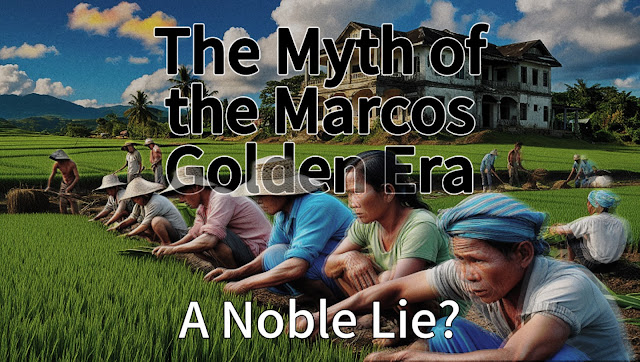- Get link
- X
- Other Apps
- Get link
- X
- Other Apps
The Marcos family's attempt to sanitize their legacy through "noble lies" is a complex and troubling narrative that reflects broader themes of historical revisionism and propaganda. By leveraging these deceptive narratives, they aim to reshape public perception of a regime marked by corruption, human rights abuses, and violence.
Origins of Noble Lies
The term "noble lie" originates from Plato's *The Republic*, where it describes falsehoods propagated by rulers to maintain social order and promote the common good. Plato argued that such lies could be justified if they served a higher purpose, such as fostering unity or stability within a society. In contemporary contexts, noble lies often manifest in political rhetoric, where leaders manipulate facts to garner support or distract from uncomfortable truths.
The Marcos Regime: A Reign of Terror
Ferdinand Marcos Sr. ruled the Philippines from 1965 until he was ousted in 1986. His regime is infamous for declaring martial law in 1972, a move that allowed him to extend his presidency and suppress dissent. During this period, thousands of Filipinos were arrested, tortured, and killed, with human rights violations documented extensively by organizations like Amnesty International.
The Marcos regime was marked by rampant corruption, with estimates suggesting that the family and their associates embezzled between $5 billion to $10 billion from the Philippine treasury. Despite these facts, the Marcos family has sought to rewrite this history, portraying their time in power as a golden era of economic growth and stability.
The Marcos Family's Use of Noble Lies
In recent years, the Marcos family, particularly Ferdinand "Bongbong" Marcos Jr., has employed noble lies to reshape their legacy. This effort includes:
Historical Revisionism
The Marcos family has engaged in extensive historical revisionism, claiming that the martial law years were a time of peace and prosperity. They promote narratives that downplay the violence and corruption of the era, often presenting their father's rule as a necessary response to the chaos of the 1970s. This narrative is bolstered by social media campaigns that spread misinformation and glorify the Marcos legacy.
Veiled Propaganda
The Marcos family has utilized state resources and its media outlets to propagate their version of history. This includes funding for pro-Marcos documentaries and the use of social media influencers to disseminate misleading information. For instance, Imelda Marcos famously stated, “Perception is real, the truth is not,” encapsulating the family's approach to managing their public image.
Targeting Opponents
The Marcos family has also sought to vilify their political opponents, particularly the Aquinos, framing them as corrupt and ineffective. This strategy not only distracts from the Marcos regime's abuses but also polarizes public opinion, creating a false dichotomy between the Marcoses and their rivals.
The Impact of Noble Lies on Filipino Society
The Marcos family's attempts to sanitize their legacy have had significant implications for Filipino society. The spread of noble lies has contributed to a generational divide in perceptions of the Marcos era. Younger Filipinos, often lacking firsthand experience of the martial law years, may be more susceptible to the glorified narratives propagated by the Marcos family.
Moreover, the normalization of historical revisionism poses a threat to democratic values and accountability. By undermining the truth about the past, the Marcos family seeks to erase the memories of those who suffered under their regime, including the families of victims of enforced disappearances and extrajudicial killings.
While the general public is distracted by their antics, the cycle of corruption continues. Inflation has risen to debilitating highs. The purchase power of the poorest have significantly decreased. The middle-class has started to feel the pinch. The favoured continue to plunder government coffers.
The Fight for Truth
The Marcos family's use of noble lies to sanitize their legacy is a stark reminder of the power of propaganda and the importance of historical accuracy. As they continue to manipulate narratives to regain political power, the struggle for truth and accountability becomes increasingly vital.
Filipinos must remain vigilant against historical revisionism and strive to remember the realities of the Marcos regime. The fight against noble lies is not just about preserving history; it is about ensuring that the lessons of the past inform the future. As the Marcos family attempts to rewrite their narrative, the collective memory of the Filipino people must serve as a bulwark against their efforts, ensuring that the truth prevails over deception.

Comments
Post a Comment